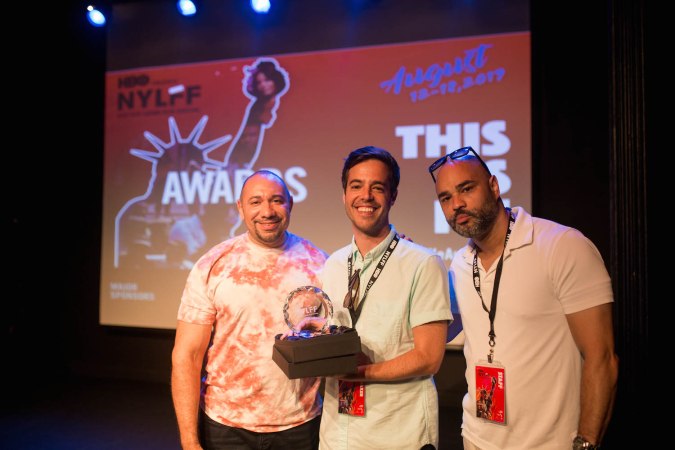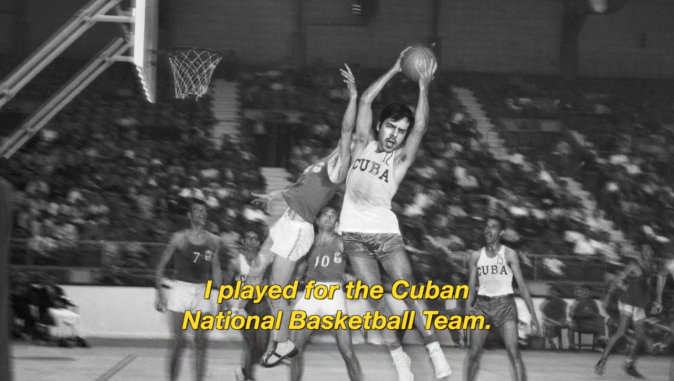Some of the best short films are more than just about one subject. There’s a depth to their stories that could put some studio-made, feature-length projects to shame. In the case of Eddie Mujica‘s hilarious mockumentary, Cuban Missile Crisis (from the web series Uno Por Uno), the filmmaker not only spoofs the “talking head” visual style of TV documentaries like an episode of Documentary Now!, he also has a few laughs at the underdog narrative arcs of sports movies, lovingly teases Cuban culture and pokes fun at Hollywood’s continued exclusion of Latinx stories. His pointed critique even goes so far as to draw attention to the precarious times facing many immigrants in the United States.
Ahead of his screening at the New York Latino Film Festival and winning the best web series award at the fest, we spoke with Mujica about how growing up in Hialeah influenced his main character, his background in comedy groups and the short’s tribute to his grandfather.
Where did you get the idea for Uno Por Uno: Cuban Missile Crisis?
I am the son of Cuban immigrants. Being an actor-writer-director, I’ve always wanted to tell and be a part of Latinx stories that are authentic to me. It’s a blend of that and being a big sports fan. I love ESPN and the 30 for 30 documentaries. I’ve seen a couple that deals with the Latinx experience, but I wanted to tell a fun story with my love of basketball. The “Cuban missile crisis” was actually a nickname that was given to me by a friend when I played pickup basketball because I shoot three-pointers.
I’ve always written my own things because of my passion for it. I feel like in Hollywood, it’s tough for me because of my appearance. I get questioned sometimes when I go in for Latinx roles. They say, “Oh you can pass as white,” or I have to prove my Latino-ness. Well, let me write something that for sure I know I can play. I would never audition for anything like this, but I feel like I can. I know it well because it’s so authentic to me.
You comment on the scarcity of Latinx stories in Hollywood in a very clever way. Why did you decide to lead with that?
There are so many different stories to tell. This is just one from my particular POV. Latinx is such a wide spectrum, but we seem to be bottled into one — and only one particular story can be told at a time. I called it Uno Por Uno because the fake director that I made, Joaquín del Cine, is this guy who wants to tell these stories, but in Hollywood, we could only get one [story]. If I had the money, I would absolutely tell a bunch of different Latinx stories — other ones in the sports world or a sort of Behind the Music [show] on a Latinx band. There are so many different stories to tell that I could have fun with. I sort of jokingly named it Uno Por Uno thinking this is the one that I have the money for right now, and if someone wants to give me money to make more, I’ll be happy to.

From the name starting with a “Y” to how he plays basketball in flip-flops, the short’s character, Yuskobe, is steeped in Cuban culture. How did you come up with his story?
I’m from Miami, specifically Hialeah, which is where the highest percentage of Cubans and Cuban-Americans in the U.S. live. I grew up in North Havana, essentially. I know people like that. I know people that would dress like that and come out to the courts. I would know people who start their name with a “Y.” I went to school with girls named Yusleidy or Yanisleydis, and the boys had the “Y” name too. I was like, ‘What’s a fun name that starts with a “Y” that could combine showing this guy’s love of basketball and show his lineage?’ His dad is Yusmail like the “Mailman” Karl Malone.
The Cubanisms just come right out. Those are like second nature to me, like saying “dale” on the court or giving out nicknames to people. That’s what I grew up around. It’s funny how I feel like it’s super specific to my experience, but in my experience, showing it to people or having it screen at festivals, people that aren’t Cuban — whether they’re Latino or Latinx or not — I feel can relate to it. Even though it’s super specific, there are certain things that I feel like are universal.
At the very end, you see a photo that comes up at the end of the short. That’s my grandfather who passed away years ago, but he played basketball in Cuba, so he was another influence on it [the short]. I found that out when I went home for Christmas a couple of years ago, and my dad got this photo album from one of his sisters and was like, “Oh, check this out,” and I’m looking through them. I’m like, “Wait a minute. My grandfather was a baller? This is amazing.”

The short grows from a comical 30 For 30 spoof into something more dramatic when it addresses some of the harsh realities facing immigrants today, like increased deportations. What inspired you to explore that?
I did a lot at the Second City in Chicago where they really champion you to own your voice and your point of view. And my point of view is I like to say something with my work, but my background is in comedy so if I can make people laugh while doing that, then that’s a win-win for me. I feel like with this particular short, I have this character that comes across as super likable and you’re following along the story, he wins, but then let’s throw a little bit of a reality check and the audience can think, “Oh, this can happen to him. This can happen to anyone.” This is actually happening to people right now, so let’s not ignore that.
What’s next for you?
I’m just continuing to make stuff. I’m in New York right now for the New York Latino Film Festival where this is screening and my other short, Dreamer, is screening. Earlier this year, I was picked as an HBO Access writer fellow, so I’m currently developing a pilot with HBO. I also produce a monthly all-Latinx variety show in L.A. where my improv team speaks Spanish. We host like a bunch of other Latinx performers and yes, that creates opportunities for others but also for myself. The most I’ve ever gotten out of my career has been when instead of waiting around, I’m just making things.




